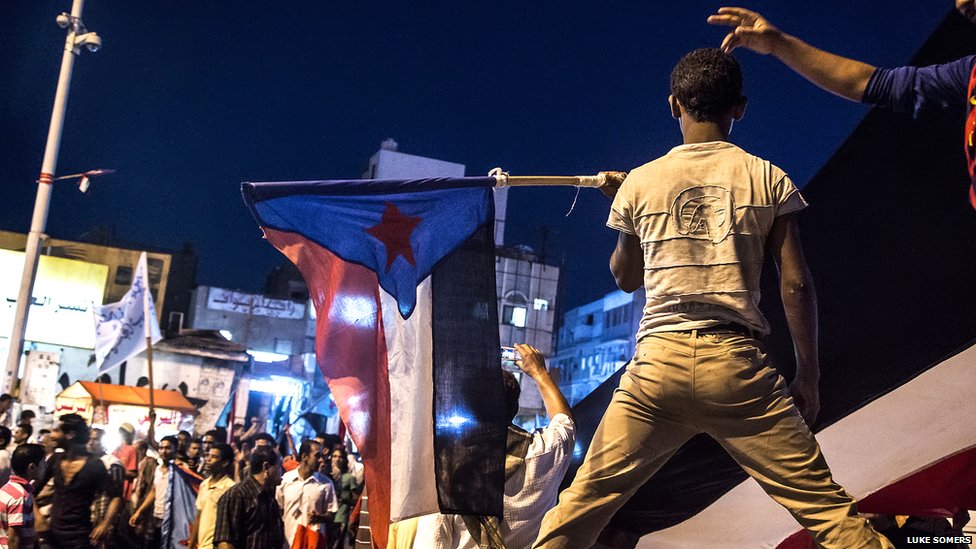At a protest in Aden, a young man holds the flag of the Southern Movement and the former People's Democratic Republic of Yemen
Writing for the Financial Times Magazine, Abigail Fielding-Smith profiles the uncertainty of life in southern Yemen, nine months after President Ali Abdullah Saleh finally gave way to the uprising against his 33-year rule:
A short while ago, I swept past the Victorian garrison church overlooking the port city of Aden in southwest Yemen for the first time in more than a year. The trickle of news which car bombs force out of this otherworldly place at the bottom of the Arabian peninsula, with its volcanic crags and strangely empty shoreline, had done nothing to prepare me for how much it had changed.
When I last visited the city at the end of 2010, before the uprising that unseated President Ali Abdullah Saleh, it was the closest thing to an authoritarian police state in the otherwise chaotically ruled country. Troops were everywhere and people were afraid to talk to journalists on the street. Today, there is anti-government graffiti throughout the city, and government troops warned us to stay away from one street because of snipers. On the eastern highway out of the city, fighting between the army and al-Qaeda-linked militants had left the street lights bent like storm-felled trees.
In the space of 30 years, Aden has been a British colony, the capital of a Soviet-backed independent republic, part of a new united Yemen, and the headquarters of a shortlived breakaway state, before being over-run and looted by the unity government’s forces. Residents say the wildly volatile state of limbo they have been in for the past year and a half is more alarming than anything they’ve experienced before.
“The government is not strong, but the people are not liberated,” said Mohamed Ali Ahmed, who recently returned after nearly three decades away and is a veteran of the south’s breakaway war. “It’s a kind of chaos –-- no one is controlling anything.”
It may not be top of the list in the capital, Sana'a, where clashes between the new president and remnants of the old regime continue, but south Yemen is slipping out of control. The absence of a legitimate authority has created the perfect playground for power struggles, not to mention al-Qaeda. Grassroots separatists warn of “catastrophic consequences” if their cause is ignored. What is happening in the south is not only one of the biggest problems facing Yemen, but potentially a global security concern.
“The rise of the southern issue was the result of not dealing with it years ago,” said Mohammed al-Mekhlafi, a socialist party politician in Sana'a trying to push the new government to adopt a law addressing southern grievances. “The alternative of seizing this opportunity to change is Yemen going to chaos.”
Predictions of chaos are nothing new. Every few years (or, increasingly, months), an event like the recent storming of the US embassy complex in Sana'a will give Yemen a brief claim on the world’s attention. The familiar litany of problems – poverty, resource scarcity, al-Qaeda, heavily armed tribes – will be rehearsed but somehow the apocalypse never comes, leaving the impression that this land of rock castles and dagger dances is unusually resilient. In reality, the mounting cost of such dysfunctionality is hidden in less visible areas, like the south, where scared citizens strive to understand the capricious machinations of the political players.
